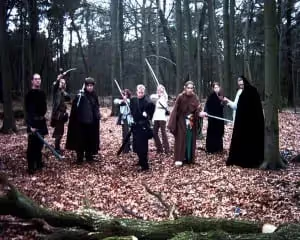The "LARP": Accurate description? Derogatory slam? Or both?
David McGinnis
August 30, 2011

The history of "policy-style" arguments being used in LD debate is longer than most of your life spans. When I began debating -- when dinosaurs roamed the earth, and George H.W. Bush was president -- anyone who spoke at faster than conversational speed was openly accused of "debating policy." (Yes, not only were we slow, but we had bad grammar.) But speak quickly they did, and it wasn't long before not only fast talking, but impact calculi and "counter plans" became common in the activity. By the time I graduated from Apple Valley High School in 1993, students were as likely to be arguing nuclear war scenarios as they were to be nattering on about "Locke's Second Treatise."
At some point, I'm not sure when, a tipping point arrived such that the combination of policy-oriented techniques utilized by some LD debaters became sufficiently totalizing of their approach to the activity that someone asserted that these debaters were actually doing policy debate. I know that in 2007, Valley ran a Congo specific AC at TOC (and so did Scarsdale, as I recall), and this was structured (as nearly as we could tell) like a policy case. At the time, we thought it was both unique and "keen."
What I'm curious about now, though, is when this practice became a defining characteristic of an overall approach to LD debate, and, specifically, when it became a divisive one. At some point, someone coined the term "LARP" to refer to this approach to debate. For those few of you who may not know, "LARP" is an acronym for "Live Action Role Playing." In the real world (that is, the non-debate world), LARPers are people who dress up in medieval costumes and have sword fights, and pretend to smite each other with spells, and such. In other words, they're playing role playing games (and what debater hasn't enjoyed a few hundred hours of that?) only they're doing it "live."
The term LARP, applied to policy-style debaters, implies that they're "pretending" to debate in a policy style. The less-than-flattering implication can be read a number of ways:
• These people don't really know anything about policy debate, they're just pretending they do, and boy, do they look silly!
• LD debate structure - in terms of time limits, time skew, overall speech length, cross-ex and prep time, etc. - does not lend itself to the thorough development and critique of policy positions, thus the best LDers can do is to "pretend" at policy debate.
Obviously, the second interpretation is kinder, but I don't know if it's more accurate. What I'm wondering is, what does it mean for the activity as a whole that such a concept exists?
For those who don't like the LARP, would you rather have a debate community in which everyone read Korsgard every round? Is there a way to engage in ends-based impact debate that doesn't suffer from some of the drawbacks associated with LARPing? And, what are those drawbacks? Which "policy-esque" aspects of this approach to people object to?
For those who prefer policy oriented debate, what aspect of it do you think is preferable to "value" debate? How do you feel about people calling you a "LARPer" -- is it a point of pride, or do you consider it an insult?